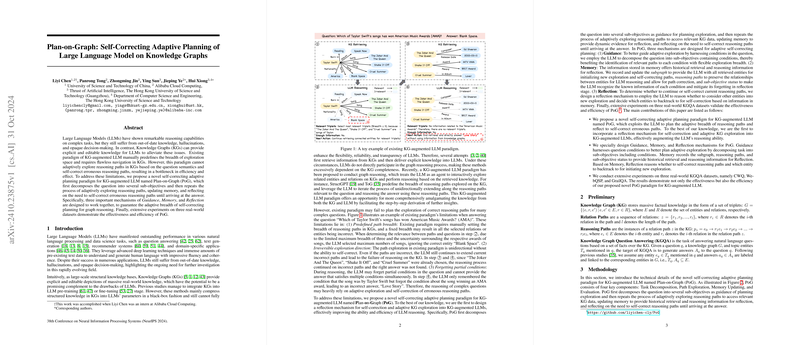Plan-on-Graph: Self-Correcting Adaptive Planning of LLMs on Knowledge Graphs
The paper introduces "Plan-on-Graph" (PoG), a paradigm shift for enhancing LLMs with Knowledge Graphs (KGs). The integration of KGs is highlighted as a promising approach to address persistent limitations in LLMs, such as outdated knowledge, hallucinatory outputs, and opaque decision-making. Conventional approaches rely on manually predefined KG exploration spaces, which may lead to inefficiencies and errors when the requisite breadth or paths are misaligned with the query semantics. The authors present a self-correcting adaptive planning mechanism designed to iterate over reasoning paths with flexibility and responsiveness to improve the reliability and effectiveness of LLM-KG interactions.
Core Contributions
The paper outlines several innovative components:
- Guidance Mechanism: PoG begins by decomposing the user question into sub-objectives, each representing conditions derived from the query. This approach guides the reasoning process with a structured pathway, allowing dynamic adjustment of the exploration breadth in KGs.
- Memory Mechanism: Information retrieval and reasoning paths are continuously recorded to facilitate historical analysis and reflection. The memory captures three aspects: subgraph structures, computed reasoning paths, and current statuses of sub-objectives. This aids in maintaining a coherent state across iterations, allowing the LLM to understand and adapt based on evolving data.
- Reflection Mechanism: Reflection is key to PoG's self-correction capability. The LLM is prompted to evaluate whether the currently explored paths adequately address the sub-objectives. If the existing paths are deemed insufficient, reflection guides the LLM to correct its course by revisiting prior structures recorded in memory and undertaking alternative explorations.
Experimental Validation and Numerical Results
Extensive experiments verify PoG's effectiveness using three datasets: ComplexWebQuestions (CWQ), WebQuestionsSP (WebQSP), and GrailQA, all relying on Freebase knowledge. PoG demonstrates superior performance metrics particularly noted in non-I.I.D. tasks, suggesting its robustness in variable contexts. For instance, on CWQ, PoG achieved a noteworthy performance increase relative to existing KG-augmented methods. These results suggest that adaptive and self-corrective reasoning frameworks significantly enhance LLM capabilities when interfacing with large-scale, structured datasets like KGs.
Potential Implications and Future Directions
Practically, PoG's framework could be transformative in domains requiring complex reasoning over rapidly evolving datasets, such as real-time data processing and dynamic decision-making systems. Theoretically, it advances the field by bridging semantic reasoning in LLMs and structured data navigation, setting a precedent for future explorations in hybrid AI systems.
Future directions could include refining confidence assessments in LLM evaluations, to better anticipate and manage uncertainties in path exploration. Another avenue could explore minimizing requisite computational steps, improving efficiency without sacrificing the precision of outcomes. Moreover, addressing non-standardized or incomplete queries remains a fertile ground for enhancing the adaptability of such systems.
In conclusion, "Plan-on-Graph" marks a significant advance in addressing the adaptability and reliability issues of LLMs interfacing with KGs, ensuring that both theoretical frameworks and practical applications are poised for enhanced performance in complex reasoning tasks.
